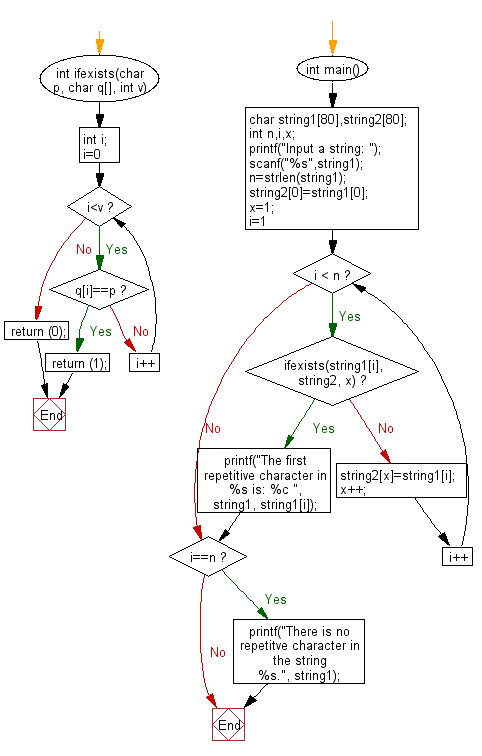C Programming: Find the repeated character in a given string
C String: Exercise-32 with Solution
Write a C programming to find the repeated character in a given string.
Sample Solution:
C Code:
#include<stdio.h>
#include
int ifexists(char p, char q[], int v)
{
int i;
for (i=0; i<v;i++)
if (q[i]==p) return (1);
return (0);
}
int main()
{
char string1[80],string2[80];
int n,i,x;
printf("Input a string: ");
scanf("%s",string1);
n=strlen(string1);
string2[0]=string1[0];
x=1;
for(i=1;i < n; i++)
{
if(ifexists(string1[i], string2, x))
{
printf("The first repetitive character in %s is: %c ", string1, string1[i]);
break;
}
else
{
string2[x]=string1[i];
x++;
}
}
if(i==n)
printf("There is no repetitve character in the string %s.", string1);
}
Sample Output:
Input a string: The first repetitive character in w3resource is: r
Flowchart :

C Programming Code Editor:
Improve this sample solution and post your code through Disqus.
Previous: Write a program in C to split string by space into words.
Next: Write a C programming to count of each character in a given string.
What is the difficulty level of this exercise?
Test your Programming skills with w3resource's quiz.
C Programming: Tips of the Day
Static variable inside of a function in C
The scope of variable is where the variable name can be seen. Here, x is visible only inside function foo().
The lifetime of a variable is the period over which it exists. If x were defined without the keyword static, the lifetime would be from the entry into foo() to the return from foo(); so it would be re-initialized to 5 on every call.
The keyword static acts to extend the lifetime of a variable to the lifetime of the programme; e.g. initialization occurs once and once only and then the variable retains its value - whatever it has come to be - over all future calls to foo().
Ref : https://bit.ly/3fOq7XP
- New Content published on w3resource:
- HTML-CSS Practical: Exercises, Practice, Solution
- Java Regular Expression: Exercises, Practice, Solution
- Scala Programming Exercises, Practice, Solution
- Python Itertools exercises
- Python Numpy exercises
- Python GeoPy Package exercises
- Python Pandas exercises
- Python nltk exercises
- Python BeautifulSoup exercises
- Form Template
- Composer - PHP Package Manager
- PHPUnit - PHP Testing
- Laravel - PHP Framework
- Angular - JavaScript Framework
- Vue - JavaScript Framework
- Jest - JavaScript Testing Framework
